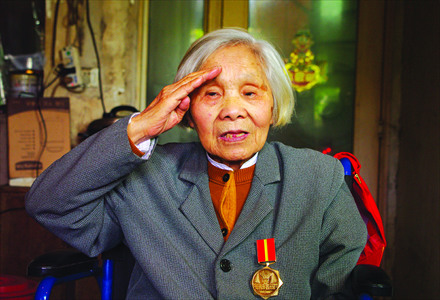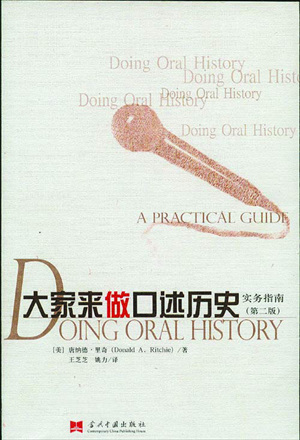

Zheng Miao was one of only a few women who served in the KMT army during the war. Photo: Courtesy of Meng Qiping

Doing Oral History,a book published by Contemporary China Publishing House
Discovering the forgotten
Liu spoke to Zheng Miao, one of the few female KMT soldiers who participated in the war still living in Changsha. Zheng joined the army in 1937 at the age of 23.
Blind, half deaf and almost paralyzed, Zheng told Liu that for the past decade, she has been living in a dimly lit basement. Its walls are covered with water spots.
Liu connected with Zheng through her alma mater, the Republic of China Military Academy (RCMA). Liu said he will never forget the moment he first saw Zheng.
"She was sitting quietly in a wheelchair against the wall," said Liu. "When Zheng's daughter shouted in a booming voice that people from RCMA Alumni had come to see her, her vitality returned. She grabbed our hands and held them firmly, and asked our names. She can't see, so she tried to feel us." This was no dryly-worded textbook.
During wartime, Zheng worked for the field hospital, writing letters for illiterate soldiers and serving as a nurse when necessary. She met her husband there and gave birth to their son.
The Cultural Revolution robbed Zheng of the dignity she felt as a war veteran. Local mobs destroyed her house and later killed her only son. Her husband was forced to do heavy labor in spite of a wartime injury to his spine.
It was not until recent years when Zheng's stories were discovered by local history researchers that her life gradually improved, yet according to her, there is still no official recognition of her wartime efforts, and she has received no support from local government.
Racing against time
From Jilin Province in the north to Guangzhou Province in the south, concern for oral history is growing in China. Academic researchers and amateur history buffs are starting to write down the stories of elders about various issues like war, literature, art and even kung fu. Over the past few years, many books and documentaries based on oral history have been published.
But all these people are facing one similar enemy: time.
For example, Cui Yongyuan, China's top TV anchor and director of an oral history nonprofit, said at a public seminar that in 2006, his team interviewed 103 soldiers who joined the war against the Japanese and when they returned for follow-up interviews one year later, more than 70 of them had passed away. Of all the 4,000 interviewees they contacted in recent years for CCTV documentary films such as My Anti-Japanese War I & II, more than 1,000 of them have passed away.
Liu has tried to use his footage of old KMT soldiers like Zheng to persuade local media to call out for their welfare, but he's rarely acknowledged. He also tried to upload complaints about unfair treatment of former KMT soldiers onto Internet forums, but not all of them made it through censors.
Even so, Liu said that he wants to do more recordings.
"Some of the soldiers [I met] were paralyzed, some suffered from serious heart disease, but when talking about the war they all became excited: talking loudly, waving their hands. They were so devoted to that war. They deserve recognition," Liu said.
Though Chen was among the few early birds collecting oral history, he often regrets not doing more interviews during the 1990s.
"Too many people have passed, too many witnesses of history," said Chen. "Can you imagine how many secrets they have taken away with them?"
Copyright ©1999-2018
Chinanews.com. All rights reserved.
Reproduction in whole or in part without permission is prohibited.